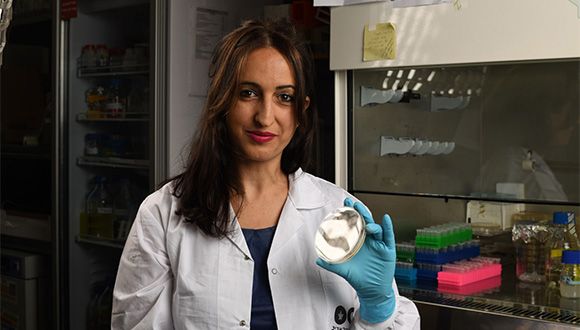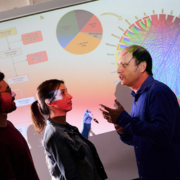TAU Researcher Invents Environmentally-Friendly Sanitizer
Innovative method to convert waste into disinfectant is a pandemic game-changer
The fight against coronavirus began with disinfection and hygiene. Prof. Hadas Mamane, head of the Water-Tech Laboratory at TAU’s Iby & Aladar Fleischman Faculty of Engineering is now helping to secure Israel's sanitizer supply in the ongoing battle against the spread of coronavirus. Her lab is running a pilot program to convert local waste into alcohol that will be used for sanitation and disinfection.
In the COVID-19 era, global demand for alcohol-based sanitizer soared, as proper hygiene and sanitation became mainstays of prevention efforts. Yet at the same time, many countries, including Israel, imposed import restrictions, making the procurement of sanitation and disinfectant materials difficult. To address this shortage, a team led Prof. Mamane adapted an existing waste conversion model to produce alcohol disinfectant locally.
Prof. Mamane's team began by running an experiment to make ethanol, an alcohol derived from corn and the most common ingredient in hand sanitizers and other disinfectants. As a local alternative to corn, Prof. Mamane checked a variety of waste sources. She experimented with waste from municipal and agricultural pruning, hay, paper and cardboard.
Prof. Mamane is continuing the project by using more types of green waste, testing the process on a larger scale and studying its cost-effectiveness. Because her method relies on locally sourced material, it offers a decentralized model for ethanol production that reduces reliance on imports.
Mamane’s production method not only reuses the almost endless supply of garbage, but also reduces overload on waste management systems. The process does not use hazardous materials or cause pollution, can be applied on a small or large scale, and is applicable to varied types and large amounts of waste.
This initiative has additional widespread benefits: “A decentralized [recycling] process enables farmers to avoid burning their agricultural waste, and instead offers environmental and social benefits to the community and, most importantly, protects public health,” says Prof. Mamane.
This research is a collaboration between Prof. Mamane and the University of Haifa-Oranim College, and is funded by the Ministry of Science.






